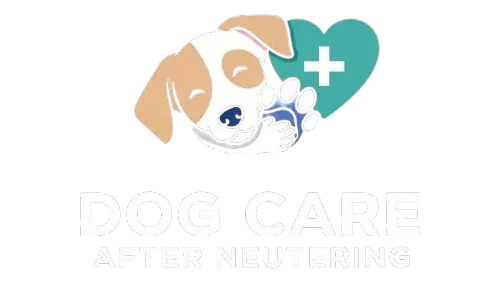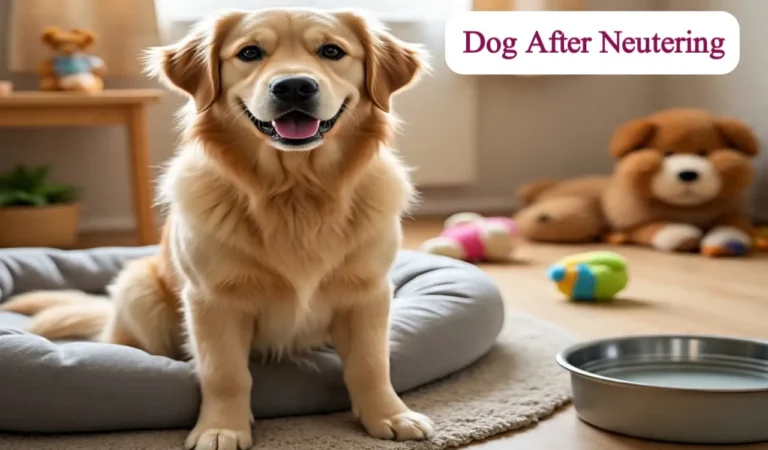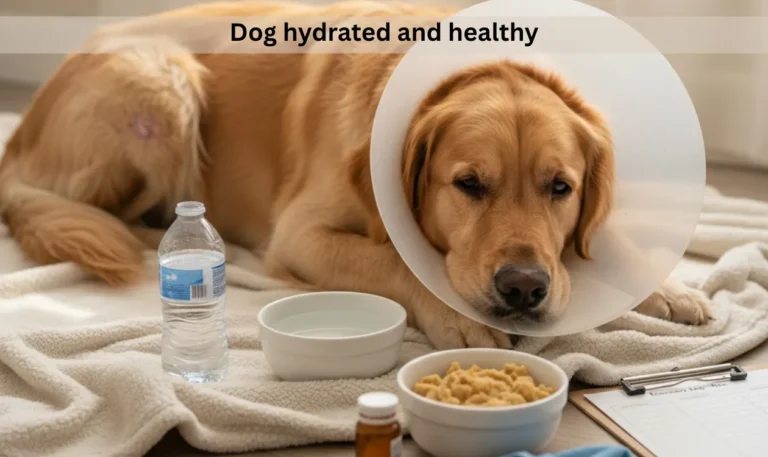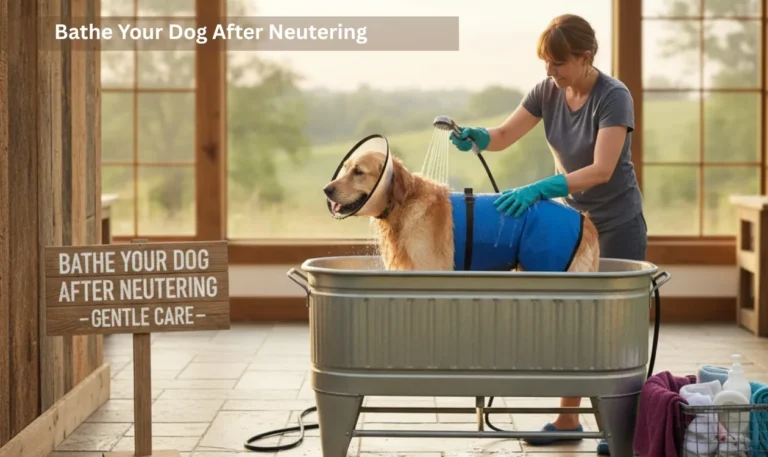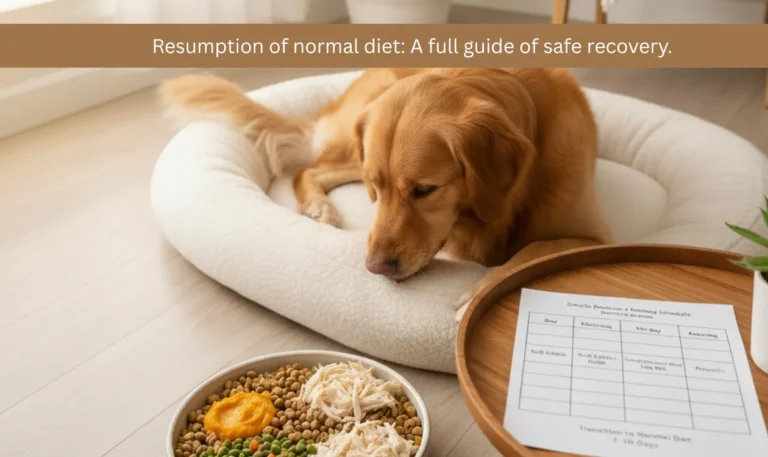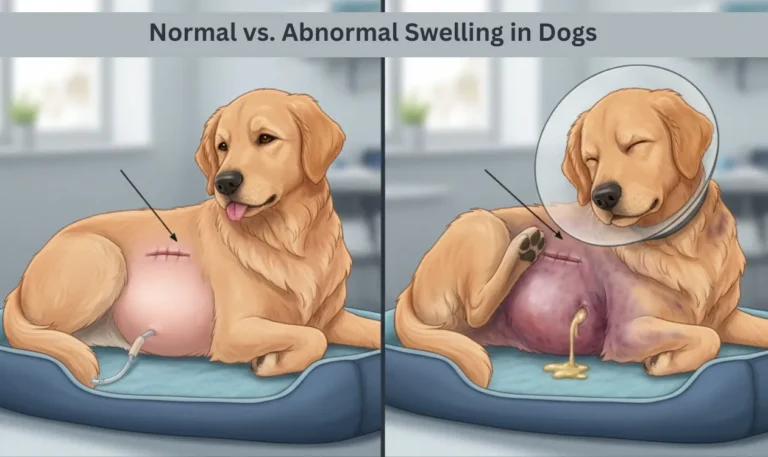The Ultimate Canine Neutering Dog Feeding tips
Explore the best canine neutering dog feeding tips, safe foods, and nutrition advice to help your dog recover faster and stay healthy post surgery.
Anesthesia and surgeries of neutering may cause the digestive system of your dog to become sensitive. It is advisable to feed soft food because it facilitates the digestion process and avoids vomiting or stomach pain. It is soothing, enriching and helps in accelerating the healing process in the recovery stage.
Light foodstuffs also assist in keeping the body well hydrated and supplying the body with much needed nutrients without overwhelming the stomach. Whether the dog refuses to eat more (or you cannot have it chew something), with soft food, the dog care gets a balanced meal in a form that is easy to digest.
Why Soft Food Matters After Neutering
Soft food can be chewed, swallowed, and digested easily, which is essential when your dog is weak or tired after surgery. It minimizes irritation and encourages smooth bowel movements, helping your pet stay comfortable during recovery. This gentle digestion support also helps prevent constipation difficulty passing stool that can occur after surgery.
It also is very good in keeping the energy levels high because the soft food can contain nutrients. Taken in small amounts throughout the day, it promotes regular metabolism, enhances appetite, and helps to heal faster and does not overwork the digestive system.
Benefits of Feeding Soft Food Post-Surgery
Good post-neuter soft food of dogs must be high in proteins, low in fat, and full of vitamins. Chicken and turkey that is boiled, as well as plain pumpkin are some of the best options. They are easy on the stomach but rich in recovery enhancing nutrients.
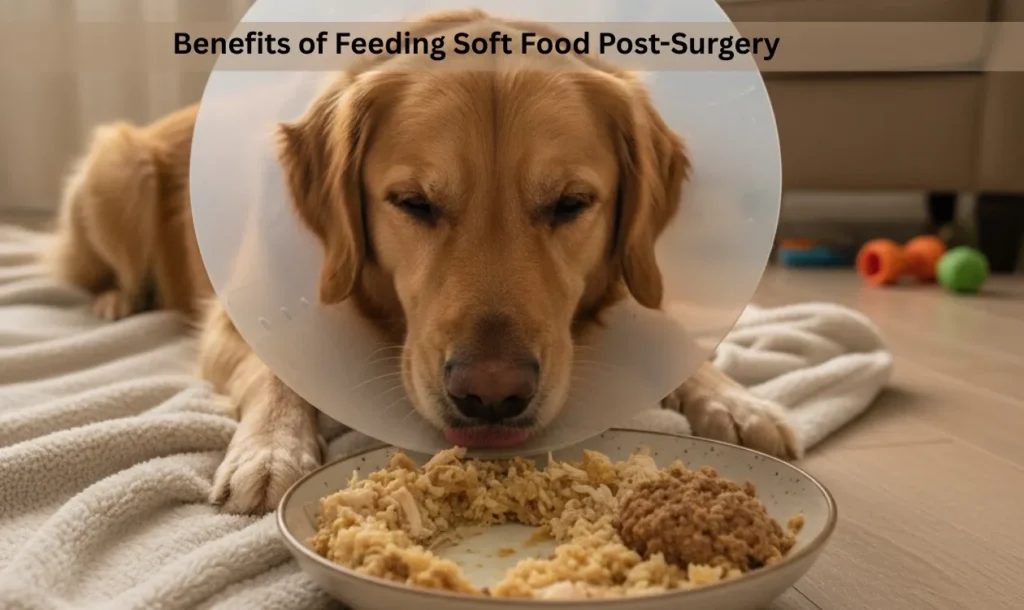
Prescription recovery diets or veter approved canned food may also be used. These are specifically made to help in healing and keeping up energy. Never add any sort of seasoning, oil or any artificial additives to the food that you are giving your dog as it may upset his stomach.
What Makes a Good Soft Food for Dogs After Neutering
Homemade food can be a good, nutritious choice that is cheap as long as you are sure what to put into the ingredients. An easy combination of cooked chicken and rice might help, it is mild, nourishing, and helps in digestion. You may also include plain pumpkin or carrots as an addition of extra fiber and vitamins.
Another excellent option is shredded chicken with mashed sweet potatoes. This mix is rich in beta-carotene, which helps boost immunity and provides your dog with steady energy. Always ensure the food is fully cooked and served at room temperature. Such nutrient-rich meals also support antioxidant activity the process that protects cells from damage during recovery
Homemade Soft Food Recipes for Neutered Dogs
There are numerous high-quality brands available as recovery foods. Look for labels that mention post-surgery, low-fat, or digestive care formulas. These balanced diets are often recommended by veterinarians for sensitive dogs. Following the right dog feeding tips helps ensure your pet gets proper nutrition during recovery.
Wet food prepared using real meat and the necessary minerals are popular. Do not use the brands that contain fillers such as corn, soy, or artificial colors. A dog should eat the most natural food that is rich in nutrients and that you should keep an eye on ingredient lists to make sure you are feeding the dog with this. Here is best blog to gain knowledge about Canine Neutering Dog Feeding tips.
Store-Bought Soft Food Options
Neutered dogs need small and frequent meals. Their metabolism slows down temporarily, and overeating can cause nausea or bloating. Begin with half the usual portion size and gradually increase it as the appetite improves. Eating too much too soon can sometimes lead to gastric dysmotility an abnormal slowdown in the movement of food through the stomach.
Instead of feeding your dog only one big meal per day, feed him two to three small meals. This is useful in ensuring the body has a constant amount of energy and eases the pressure on the digestive system. The same regular feeding schedule will also aid the body to adjust to a healthy post-surgery routine.
Portion Control and Feeding Schedule
Nutrition: water is important in the recovery of neutering. Already, soft foods already have moisture in them though yet your dog still requires access to clean fresh water. With the help of proper hydration, anesthesia is flushed, digestion is enhanced, and healing is promoted.
In case your dog does not accept water, add a spoon of low-sodium chicken broth in his bowl. You can as well add little water to their soft food. Staying hydrated with your dog is a guarantee of a hassle-free recovery, as well as avoiding fatigue and constipation.
Hydration Along with Soft Food
It is a good sign when your dog starts eating soft food on its own. Slowly increasing appetite, energy, and mood are indications that the body is healing properly. They may also begin showing interest in light play or gentle activities. These improvements reflect normal convalescence the gradual recovery of health and strength after surgery
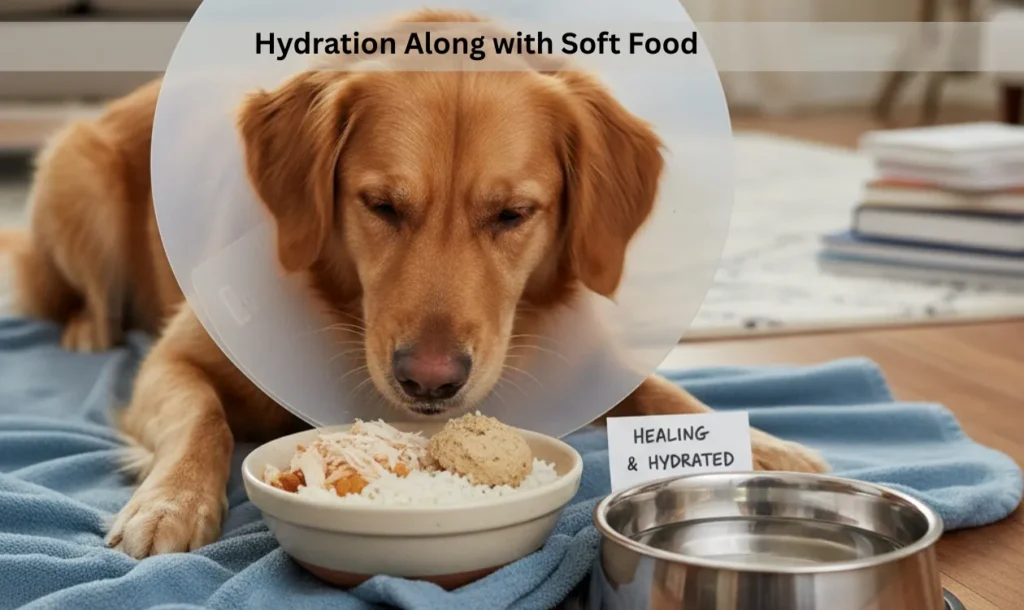
Keep an eye on the swelling or color of the incision site of your dog and also observe its stool condition. A post surgery feeding plan is effective because the following are clear indicators of normal digestion, hydration and stable eating habits.
Signs Your Dog Is Recovering Well
However, in case your dog does not accept soft food after neutering over 48-72 hours, it is advisable to communicate to your vet. Constant vomiting, loss of appetite, or even feeling of lethargy may be a sign of pain, infection or other complications that require management.
Your vet could prescribe appetite stimulants, diet supplements or other forms of feeding. Immediate response will keep your dog safe and will make him/her recover without any serious problems.
When to Contact the Veterinarian
As soon as your dog is energetic again and the operation site is healed, you need to resume the normal diet of the animal. Gradually wean dry kibble with soft food in small quantities in a week. This will avoid stomach upsets and make them adapt without any trouble.
Always remember to have portion control in order to avoid weight gain after neutering. Protein, fiber and hydration in a good balance will ensure that your dog is active, slim and happy even after recovery.
Transitioning Back to Regular Food
Once your dog’s energy returns and the surgical site heals, it’s time to shift back to their normal diet. Transition gradually by mixing small portions of dry kibble with soft food over a week. This prevents stomach upset and helps them adjust easily.
Make sure to maintain portion control to prevent post-neutering weight gain. A balanced mix of protein, fiber, and hydration will keep your dog active, lean, and happy long after recovery.
FAQs: Canine Neutering Dog Feeding tips
Final Thoughts
One of the most appropriate methods to make dogs comfortable and recover quickly after being neutered is to feed them soft food. It is sweet, healthy and keeps your dog hydrated as well as healing. A combination of the appropriate proportion of protein, fiber, and care will see your dog recover fast.
Use your vet to get different diet advice on what should be in the diet depending on the breed and health of your dog. Through patience, love, and the right nutrition you will get your furry friend back on its feet playing around in the near future.
